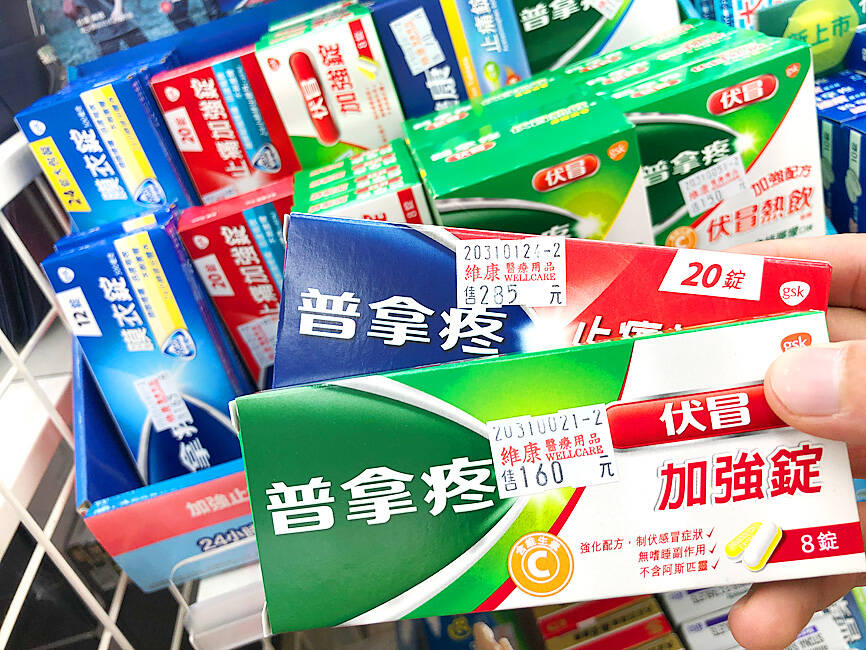The Central Epidemic Command Center (CECC) yesterday said there has been increased bulk buying of Panadol pain relief medicine, causing a shortage in the market, but people who need the medicine are recommended to buy pain relief medicine that contains the same ingredient — acetaminophen — from other brands.
In a Cabinet meeting for COVID-19 prevention and response yesterday morning, the CECC said that although the Chinese government stopped releasing comprehensive data on new cases on Tuesday last week, many news outlets reported a shortage in fever and pain-relief drugs, as well as traditional herbal medicines, indicating an increase in the number of people with fever, so it is likely that COVID-19 cases are rising in China.
The Bureau of Consular Affairs has observed more people applying to renew their passports, and many people are expected to travel abroad or return to Taiwan from the year’s end to around the Lunar New Year next month, Premier Su Tseng-chang (蘇貞昌) said.

Photo: CNA
Deputy Minister of Health and Welfare Victor Wang (王必勝), who heads the center, said the center had seen an increase in bulk buying of Panadol, a common drug for reducing pain and fever, and it has contacted the brand’s distributor in Taiwan to ask it to increase its supply, but the distributor said Panadol is in tight supply in other countries too.
There are 47 permits for producing drugs with acetaminophen held by several drug companies, so people can buy the medicine produced by other brands if they cannot find Panadol, he said.
However, Wang urged people to only buy acetaminophen when needed, and to avoid buying the medicine in bulk.
The CECC yesterday reported 10,317 new local COVID-19 cases — 4.7 percent lower than that on Monday last week — as well as 48 imported cases and 23 deaths.
Wang said 107,315 local cases were confirmed last week, 6.7 percent higher than the week before, so whether the weekly cases continue to fluctuate, or start to escalate into another wave, is uncertain and requires further observation.
Centers for Disease Control Deputy Director-General Philip Lo (羅一鈞), deputy head of the CECC’s medical response division, said that of the 23 deceased, 16 had not been vaccinated.
Of the genome sequenced cases last week, 84 percent of the local cases were infected with the Omicron BA.5 subvariant of SARS-CoV-2, which remains the dominant strain in Taiwan, he said.
Although BA.5 infections accounted for 38 percent of the sequenced imported cases last week, 29 percent were infected with BA.2.75 and 17 percent were infected with BQ.1, he said.
Regarding whether new subvariants could enter Taiwan from China, where cases are surging, Lo said two sequenced imported cases from China last week were infected with the BF.7 strain, which has mainly been reported near Beijing, and another with BA.5.

A preclearance service to facilitate entry for people traveling to select airports in Japan would be available from Thursday next week to Feb. 25 at Taiwan Taoyuan International Airport, Taoyuan International Airport Corp (TIAC) said on Tuesday. The service was first made available to Taiwanese travelers throughout the winter vacation of 2024 and during the Lunar New Year holiday. In addition to flights to the Japanese cities of Hakodate, Asahikawa, Akita, Sendai, Niigata, Okayama, Takamatsu, Kumamoto and Kagoshima, the service would be available to travelers to Kobe and Oita. The service can be accessed by passengers of 15 flight routes operated by

Chinese spouse and influencer Guan Guan’s (關關) residency permit has been revoked for repeatedly posting pro-China videos that threaten national security, the National Immigration Agency confirmed today. Guan Guan has said many controversial statements in her videos posted to Douyin (抖音), including “the red flag will soon be painted all over Taiwan” and “Taiwan is an inseparable part of China,” and expressing hope for expedited reunification. The agency last year received multiple reports alleging that Guan Guan had advocated for armed reunification. After verifying the reports, the agency last month issued a notice requiring her to appear and explain her actions. Guan

GIVE AND TAKE: Blood demand continues to rise each year, while fewer young donors are available due to the nation’s falling birthrate, a doctor said Blood donors can redeem points earned from donations to obtain limited edition Formosan black bear travel mugs, the Kaohsiung Blood Center said yesterday, as it announced a goal of stocking 20,000 units of blood prior to the Lunar New Year. The last month of the lunar year is National Blood Donation Month, when local centers seek to stockpile blood for use during the Lunar New Year holiday. The blood demand in southern Taiwan — including Tainan and Kaohsiung, as well as Chiayi, Pingtung, Penghu and Taitung counties — is about 2,000 units per day, the center said. The donation campaign aims to boost

The Central Weather Administration (CWA) said a magnitude 4.9 earthquake that struck off the coast of eastern Taiwan yesterday was an independent event and part of a stress-adjustment process. The earthquake occurred at 4:47pm, with its epicenter at sea about 45.4km south of Yilan County Hall at a depth of 5.9km, the CWA said. The quake's intensity, which gauges the actual effects of a temblor, was highest in several townships in Yilan and neighboring Hualien County, where it measured 4 on Taiwan's seven-tier intensity scale, the CWA said. Lin Po-yu (林柏佑), a division chief at the CWA's Seismological Center, told a news conference